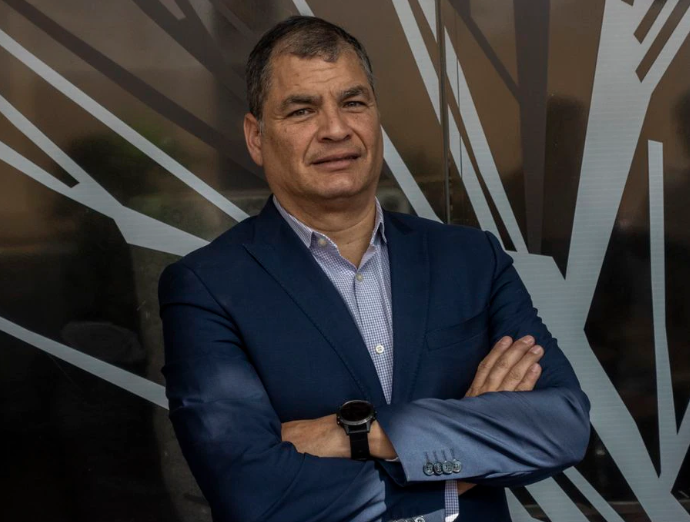Rafael Correa plots his return to Ecuador and explains how could become president again
By Inés Santaeulalia
Former Ecuadorian president Rafael Correa has the soul of a newspaper editor. In this interview, he responds to many of the questions by saying that they are false, poorly formulated, helping to spread lies and that the journalist is misinformed. But he does not avoid any of them.

Former president Rafael Correa
Correa, 59, is facing an important moment. To prevent an impeachment vote, President Guillermo Lasso dissolved the National Assembly in May and called early elections, which will take place on August 20. Correísmo, the political movement built after the former president, is so far leading in the polls, with the group seeing its highest popularity since the fall of Correa.
Correa lives in Belgium and cannot return to his country, as he faces an eight-year prison sentence and ban from office over a corruption conviction he says is a case of political persecution. From exile, however, he continues to pull the strings of his Citizen Revolution Movement, which won the local and regional elections of February. His plan is for his candidates to reach the government this year, convene a Constituent Assembly, and declare invalid the 2018 referendum that prevented his reelection. This would allow him to run again for president.
He offered these responses to questions about his future.
Inés Santaeulalia: Do you already know who will be the candidate for the Citizen Revolution Movement?
Rafael Correa: We are discussing several names. The ticket has to be mixed, that was officially resolved a couple of days ago. We are studying several combinations and the primaries will be held on Saturday. Thank God we have a lot of cadres. [Since this interview, Luisa González has been named the Correista candidate.]
IS: Do you think you will win the elections?
RC.: We are healthily confident, which is not complacency, but I think we are in a very good position. That said, after Trump, anything is possible — from who is in control of the National Electoral Council to the media’s dirty campaign, which we saw in past elections, as well as any credible lie that may be invented.
IS: The winner of the elections will only govern for the remaining year and a half of the term. Not many things can be done in that time.
RC: But it’s difficult for things to be worse [than they are now]. The situation of the country is serious, and the problem is an absolutely inept government and a president who is tremendously limited in all areas, even physically [Lasso was hospitalized in mid-April]. This should prompt a bit of sympathy, but it gives rise to indignation, because he knew about these problems and still wanted to buy the presidency out of caprice. Even if it is a transitional government, things will improve. However, if a progressive government comes to power, its hands will be tied, it will be completely limited. They [the opposition] took over the entire state with soft coups in 2018, with an alleged referendum that was absolutely unconstitutional. We are not ruling out the possibility of calling a constituent assembly [if in power] — not to create a new Constitution, although reforms are going to be made, but above all to declare the 2018 referendum invalid and to put new state authorities in place.
IS: Would that invalidate the victory of the referendum that prevented your reelection?
RC: What victory? It was the first time that a reform to the Constitution did not have constitutional control. They cheated. It was denounced at the Inter-American level, but there is no judicial independence either at the national or Inter-American level. It was the breaking point for the destruction of the country.
IS.: How do you believe you will be able to return to the country? Do you trust in the international justice or in your movement being elected to government?
RC: Getting into government, without a doubt, because everything is political. These cases are a laughingstock worldwide. While they cannot be solved nationally, internationally, there are four reports from the United Nations rapporteur denouncing the [lack of] judicial independence and the Sobornos case, in which we were involved [Correa was among dozens of former officials to be convicted of organized crime in 2020]. Internationally, it is only a matter of time before everything falls apart. But obviously if we win it collapses at once because everything is political.
IS.: Would you then seek the presidency?
RC: Even if those legal cases fall apart, I am still not qualified to run due to that cunning referendum. Now, if we declare that [2018] referendum unconstitutional, yes, I could. I do not know what the fear is about, assuming that I want to run, it is the people who choose.
IS: And the people would elect you?
RC: If the Ecuadorian people did not want me, don’t you think they would do everything possible to prevent me from returning to the country?
IS: Officially you live in Belgium, what is your real presence in the Citizen Revolution Movement?
RC: It’s a lot, of course, since I am the leader.
IS: Will the presidential candidates for the August elections be the ones you choose?
RC: I don’t know where you are drawing that conclusion from. In the case of candidates, primary elections are required, it is not my decision.
IS: Ecuador is currently suffering from a very serious security crisis. How would you address it?
RC: By doing what we did before [Correa was president from 2007 to 2017]. When we left power, Ecuador was the second-safest country in Latin America, behind Chile. Today we are the most violent. They destroyed everything. We have to go back to doing what we did before, which was so successful: integration, inclusion and social development.
IS.: Lasso says that the spike in violence is in response to the increase in drug seizures under his government, arguing that previous governments were permissive with criminal groups.
RC: What proof does he have? The question alone is helping the lie to spread. What is a useless man who has completely failed going to say? In other words, [Lasso’s arguing] the success of a safe country is not a success, but rather a defeat and an indication of guilt because we made a pact with the mafias. That argument does not stand up to scrutiny, but he continues to say it because he is a useless liar. He says it to try to justify his incompetence.
IS: What do you think of Salvadoran President Nayib Bukele’s strong-hand approach to gang violence?
RC: It’s a right-wing strategy: create terror and sell the solution. Don’t get me wrong, I don’t dislike Bukele. I believe that for great evils, great solutions are needed, and the problem of violence in El Salvador has become immense, but a universal ethical minimum must be the respect for human rights and human rights are not being respected in El Salvador. We do not need to go to those extremes, with policies and human development we can achieve what Bukele is trying to do, but without violence.
IS: Would you negotiate with the criminal groups, applying the model Colombian President Gustavo Petro wants to apply?
RC: We had problems with gangs. We gathered the guys together and told them: concentrate your youthful energy on the real struggle, which is to move the country forward. We even gave them a social center and the violence ended. But you need a cocktail of measures, not just one: the police must be better equipped, the justice system must be improved. Of course, in some case, we may need an iron fist at first, but we also need human development, conciliation, technology, institutionalism and a security system. It’s about more than just giving the police the biggest gun.
IS: Did you expect Lasso to dissolve the National Assembly and call for new elections? (A situation colloquially known as “la muerte cruzada,” or “the crossed death,” because it cuts short the mandate of both the assembly and the president.)
RC: I did not expect it, I thought he would not dare to because of the chances we would win [the new elections]. I knew that the U.S. Embassy did not support him, neither did the rest of the right wing. The argument that he needed to do so due to serious internal conflict [in the National Assembly] was false, and the Constitutional Court should have denied it, but it did not. Now, without being the right thing to do, I think it was the best thing for the country. It was also illegal because there was an impeachment trial going on. In that case [if Lasso was removed by the Assembly in the impeachment trial], the vice president would assume power. It would essentially be the same government. So, in order to really ease the social pressure, because nobody could stand the government anymore, the best solution was to call early elections and democratically solve the problem.
IS: So, was it the right decision?
RC: I think it is good, but in philosophy there is a difference between what is right and what is good. The right thing to do was to allow the impeachment trial. The better thing, the good thing, was to call early elections.
IS: What did you think when you heard the news?
RC: I tried to understand why he had done it. And I think there is a very reasonable hypothesis. If the vice president took office, he would be a puppet of the Social Christian Party. It would be like handing over the government to the party, and they hate each other to death. Between giving power to the Social Christian Party and being persecuted, because that party persecutes, and the possibility of us winning, knowing that we are not bad people and that we do not persecute, he opted for the latter.
IS: Did he prefer you to the Social Christians?
RC: He prefers to run the risk of us winning because he knows that we are not bad people, and that we are not going to persecute him.
IS; If your party reaches government, what will happen with State Attorney General, Diana Salazar [who asked for Correa’s arrest]?
RC: That lady will have to face justice, she is an impostor. She has kept all the protection of the state and believes she is untouchable, but once she loses that protection she will have to face the truth. Justice will be a serious problem for her. The word that our corrupt adversaries fear the most is true justice.
IS: During your term in office, the Odebrecht case broke out. Did you use your power to stop political trials against some of your ministers?
RC: Look at how inaccurate you are about the case. What you are telling me is not true. With all due respect, it is not true.
IS: Do you acknowledge that there was oil corruption in your time?
RC: What country does not have oil corruption? Corruption occurs in Spain, in the Vatican, but it is one thing to have corruption and another to tolerate corruption. During my government, we were the Latin American country that fell the most in the corruption rankings, but what are we talking about?
___________________
Credit: El Pais





















